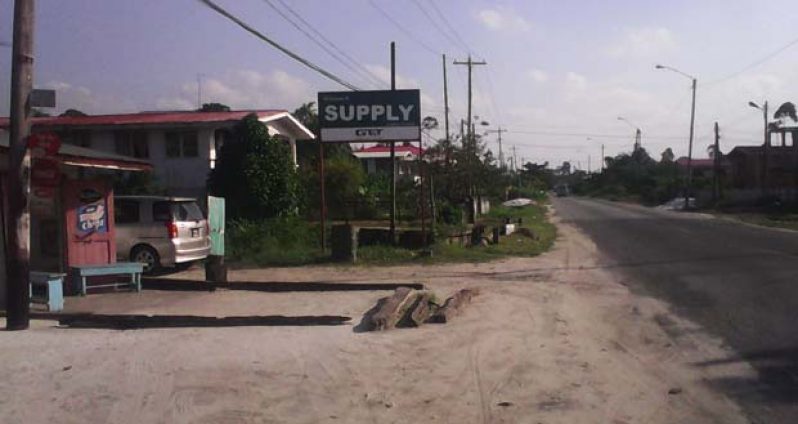This week I was certainly looking for a village with upbeat festivity, tropical energy and that special ‘country side sparkle’ that is a plus in many of our beautiful locations.

I had tons of villages to choose from but I wanted something simple, yet intriguing. I wanted a village that soothes the mind yet excites the spirits at the same time and I could think of no other village than Supply on the East Bank of Demerara.
I loved the ring of the village name in my ears and my mind danced with dazzling scenes intense frolic, bubbling festivity and bronzed skinned inhabitants prancing about. That was not going to be because when I arrived there I discovered that this village was a pleasurable, quiet little alcove where cheery and contented residents were enjoying the joys of the tropical sunshine.

But despite the fact that it was as bejewelled as I expected, I soon found out that this little East Bank Demerara village was rich in hospitality, jovial festivity and a distinct harmony amongst residents that made it richer than bags of gold and diamonds.
Supply is located just over ten miles from Georgetown, on the East Bank of Demerara and is flanked by the busier village of Brickery to the east and Support to the west. Actually most villagers would refer to all three sections as ‘Supply Village’ which has become the trend over the years.
This village is predominantly occupied by residents of African origin, but there is a notable percentage of East Indians, Amerindians and mixed

races residing there too.
The village according some residents, has close to fifty households, and has a population of close to 2,000. One must be careful however, not to mix up this village with one that is given the same name and is located in the Mahaica District, on the East Coast of Demerara
Our Arrival

I arrived in this endearing village at about 10:30 hours and already it was abuzz with activity. I was told that at midday hours the village seems to sleep, but awakens with a bustle of activity, with an amusing spectacle of muddied-feet little boys and girls chasing each other in open yards. Their playful giggles and joyous screams echoed in the air and dragonflies and butterflies darting about above their heads seemed to mirror their ‘gleeful reign of the rich land spaces.’
Older boys were seen drawing water from stand pipes their voices a bellow of cheerful masculine banter, as they loudly discussed their female conquests over the weeks, cricket, the hottest movies and such boyish issues.
A few amply built, curvy mothers were either busying themselves with preparing a tasty countryside lunch, or rushing off to get groceries and

other household supplies from the few grocery stalls and shops found around the village.
Then there was this stirring sight of cattle and sheep mulling about in the pastures, either munching on juicy grass or staring at us with rolling, beady eyes as if they were daring us to intrude and disturb their peace and control of the grass fields.
Small streams and trenches bubbled peacefully, rich in varying ‘bush fish species’ that could be seen darting about in the clear waters without a care in the world, while a few donkeys pierced the colourful buzz of the village with their loud and sudden ‘braying’ that startled even some of the villages who were accustomed to their sudden ‘donkey outbursts.’
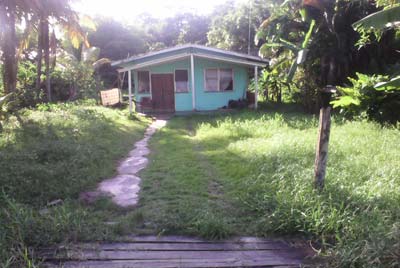
Supply, for me was just simply divine and its riches lie in the smiling faces of its people, and the rich bond of peaceful harmony that connected and held together every villager together.
Small groups were gathered in some places enjoying fresh water coconuts from trees in their own backyards, the sweet tasting liquid tricking down their chins, bulging their chests and bellies.
The ceaseless chatter of housewives was very amusing, as was their jovial banter about issues prevailing in their village. And I almost giggled out loud as one housewife hanging over a fence; wantonly spoke of her husband’s lack of responsiveness in the bedroom, evoking raucous peals of laughter from her female companions.
Livelihood in the village
Everything just appears to be in place and so correct in this little village. And it’s indeed amazing to observe how villagers live
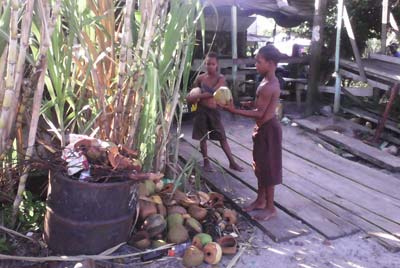
from day to day and bask in the glory of their simple existence.
Everyone in this village adopts the ‘get up and get attitude,’ and certainly does not sit around waiting for ‘manna to fall out of the heavens.’
In some sections of the village, housewives control the operations of several makeshift grocery stalls while just a few operate from much larger outlets. The husbands and older boys in the home are engaged in small scale farming, fishing and even shoemaking and repairs.

A large number of males also have taken up positions as labourers, supervisors and operators at the Barama operations at Land of Canaan, not so far away, while others seek other jobs outside the village.
Some mothers make a quick dollar selling icicles, custard blocks, fudge, poulori, fruit juice and egg balls along the roadside, while others make a thriving existence on the rearing of poultry, sheep and cattle, which appears to have been a traditional custom of villagers.
At least three individuals indicated that they still manage to make a living from the making of coconut oil which they sell around the village.
Leisure Time Entertainment
There are really no nightclubs or discos in the village, but residents hardly seem to mind, since they are contented to watch television, or listen
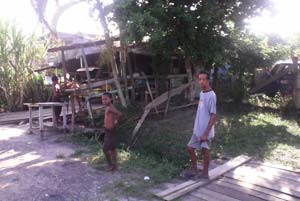
to music from their radios or small stereo systems.
There are at least two small ‘hang out spots’ where villagers can retreat to enjoy beverages and good music. However, villagers do have other choices, since they can just step over to other villages for selective entertainment, or some even travel to the capital city for ‘night fun.’
Villagers for sure welcome with great excitement the hosting of a birthday celebration, weddings and even reunions. When such events occur, villagers gather in their numbers and very often curious uninvited individuals come in for a good tongue lashing, or verbal reprimanding from the hosts when they ‘go too hard’ on the food or liquor.
Self Help Indulgence

What struck me, and was very pleasing to the eyes, is the manner in which villagers exuded a ‘ready to go attitude’ and seemed ready to ‘fix things’ in the village and not wait on the authorities who they said would often drag their feet on certain issues.
As we walked about the village, young men could be seen weeding drains and yards overgrown with bushes, while others were observed mixing cement by the roadside to make repairs and alterations to their homes.
We were very surprised when we were told that some of the ‘nice looking homes’ in the village were actually built through combined family efforts. Surely it seemed, villagers in Supply are actually gifted tradesmen.
Speaking to grocery stall owner, Sharon Semple, we learnt on weekends that mothers and housewives and their spouses would often join forces to clean and upgrade their surroundings. She explained that at intervals public spirited citizens would often clean drains around their homes to avoid flooding during heavy rainfall.
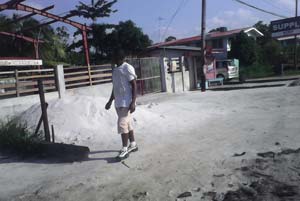
Enticing Harmony
Since the olden days Supply has been a location where harmony and intense unity flows naturally amongst the residents. As we traversed sandy streets and passed animals grazing lazily in the hot sun, housewives could be seen chatting from their bedroom windows, peals of feminine laughter renting the air as they exploded mirthfully at their very suggestive jokes and girlish gossips.
With their chiselled bodies shining as the sun struck them, men bellowed at each other in ‘mock wrath and anger,’ as they argued and chided each other over ‘unfortunate incidents’ by the roadside, or just guffawed with masculine rivalry when they were victorious at games of cards or dominoes.

Youngsters hopped about gleefully in open yards, tumbling over each other as they engaged in games of circle tennis, hop-scotch or marbles.
Conversations in the grocery stalls were jovial, merry as mothers stocked up on their kitchen supplies and goodies for the kids. Young girls going on errands were in pleasant conversation, pausing every now and then to showcase their ‘gesticulating sauciness’ as they discussed ‘boyfriend topics’ and hot teenaged gossips quite loudly without a care in the world.
All around the village, a few little kids followed us giggling in ‘shine eyed wonder’ at our flashing cameras and the swiftly moving pen as it dictated information on the village to a writing pad.
Employment
This village it seemed was not affected by unemployment since its inhabitants were either working in other areas or gainfully employed as shop owners, farmers, or minibus drivers.
The smiling and very pleasant Quincy Welcome however raised concerns about the increase in population there and the lack of job opportunities for the few that are qualified. “Everyone does ‘get up and get’ in this village. Nobody do not sit down and wait for a miracle. We are a contented people and we believe in helping ourselves. But what worries me a little in the fact that our population is growing and there is not really here for some qualified youths to do in terms of job opportunities. You see the East Bank is not so developed like the city, so there are greater difficulties in getting jobs for those that are qualified.”
That aside, this village is simply adorable, and the way in which residents attempt to meet their needs through self-orchestrated means is truly amazing. If one does not possess a curious or investigative mind they might quickly regard Supply as just ‘another village.’ However, let me inform that this village is certainly a breath taking location and is certainly worth visiting.
The infrastructure could do with some sprucing up…
The alleyways, pathways and little dams that allow the residents from the backland areas to get to the public roads could certainly do with some sprucing up, or maybe some asphalt covering.
Villagers bemoaned the fact that in the rainy seasons the dams become almost impassible unless resident were ready for a ‘mud trek.’ Villagers feel there is also the need to have bushes cleared from large open spaces. Some are calling on the authorities to clean a few drains and the main canal which is now overgrown with weeds and other vegetation.
There are still several side streets that have not been paved and villagers lamented that the quality of water coming from their taps are sometimes ‘rusty’ in colour with a ‘thick slimy substance’ on top sometimes.
Challenges
The challenges in the village seemed to be just a few judging from responses from those interviewed.
Poultry farmer, Dorian Williams indicated that while the village has evolved over the years into an attractive community, there is still need for a little development of its infrastructure.
He particularly mentioned the need for dams leading to the farming back lands to be built properly so as to avoid damage during rainfall when vehicles attempt to access the backland locations of the village.
Villagers are calling on donors and related authorities to donate sporting gears and other items to the village since this location are also rich in young sports men and women. Villagers are also lamenting the need for proper garbage disposal and proper maintenance of the village by the authorities designated to do so.
Transportation
Several years ago, bicycles and cars were indeed the main form of transportation in Supply. Then years after villagers became more comfortable with the arrival of the hire cars and minibuses which ply the roads continuously.
Today those cars have disappeared and villagers have to now depend on the very mini buses they sometimes avoid because of speeding drivers. Some villagers would normally use bicycles for short distances and even a few motor cycles are still around. And guess what? Some of the youths are really getting smart and are moving around on roller shoes which they claim is a more exciting form of transport.
Educational Defects
Morals have dropped considerably and school dropouts seem to be on the increase.
Speaking on the issue which greatly seemed to trouble him, villager, Sherman Clarke expressed his heartfelt hope that an institution of some sort would be erected for school dropouts and those willing to develop other talents or learn trades.
Garbage Woes
Villagers are forced to burn, or bury their garbage since there is no garbage removal system in the village. However, villagers are crying shame at outsiders who creep into the village in the still of the night to dump tons of garbage along the Burma Road which separates the village from her neighbour Catherine Ville.
Young men, in the streets related that many nights they would have to physically force truck drivers and other individuals to desist from such actions as they attempt to dump their garbage just about where they seemed pleased.
Added to that, there are also outsiders who would dump dead animals along the roadside, leaving residents to either endure the awful stench of rotten carcasses, or having to removing the foul smelling animals themselves.
Supply In Times Gone By
Way back in the early years Supply was a ‘very bushy settlement’ where one had to climb a tree to view the few buildings in the area. But one thing that always remained was the unity and love for each other amongst villagers.
According to a village elder, 73-year-old Allan Thomas, the level of ‘harmony and deep love’ between villagers in those days has changed into a place where youths have grown to become disrespectful of their elders in many instances.
Mr. Thomas reminisced on the days when they would use water from ponds and the nearby Demerara River which they would boil for dinking purposes. He said that in those days villagers would gather on the bank of the Demerara River in the dry season to wash their clothing and for bathing purposes.
Those were the days of the oil lamps and ‘flamboughs’ (lamps made from kerosene in bottles and fabric wicks) He noted that a well was dug there in the 1960s which helped villagers a lot, but that facility is not functional today. He reflected on the colonial days when the village was ruled by councillors and overseers, noting those days are still welcomed by a few villagers.
Today the village is much more attractive with impressive houses and a lone church where villagers go regularly to worship.
Their Folklore
On Emancipation Day every year, villagers would don African wear and would sing, dance and engage in great festivity in the streets. Some elderly folks in the village reflected on nights of story-telling around campfires, picnics in the woods or savannahs, and of course the traditional yearly Soiree event at which great masses congregated for a night of sizzling activity where they ‘connected with their roots.’
Some villagers still acknowledge their roots and would still practice many of the African traits and folklore.
There are quite a few single-parent mothers in the village, but what was noted is that these mothers are not waiting around for the irresponsible fathers to ‘come up with the cash,’ but instead have found jobs.
A few striking new changes
Things have indeed changed as is evident even in the mannerisms and dress code of villagers. There was a time when the majority, especially the women, could be picked out from among large crowds by their somewhat tactless attire. Now the very ‘country lasses’ pack a severe punch with their now modern and sophisticated dress codes.
Cattle rearing and poultry farming to some extent seem to be the main sources of livelihood. Cattle farmers provide fresh milk to villagers and of course meat. Still present in the village too, are a few vegetable vendors marketing their items by pulling a cart and screaming their heads off to attract the housewives who would come rushing out to select whatever they could for their kitchen and refrigerators.
While it has been drastically reduced over the years, some fishmongers still ply their trade in the village, many of them housewives.
Frolic and fun…
Watching at the young children frolicking in the sun, and splashing in the nearby drains made me reminisce on my childhood days. Their peals of mirthful laughter filled the airs, sometimes halted by wails of pain as one fell bruising a knee or shin bone.
This will be followed by a busty mother waving a piece of stick in a menacing manner as she investigated the happenings. Most times the fun filled party breaks up and scatter in different directions as a mother began to rain lashes on her child who will writhe and wiggle to escape the blows.
Young girls seem contented to sit on the steps and style their weaves, while some young men rode bicycles at an alarming pace through the streets, or gather in groups, playing dominoes and sipping cool down (cold fruit juice in plastic bags).
On leaving the village we felt as if we left a piece of our being behind. And it was forlorn faces and feelings of regret that we finally boarded a minibus and left for Georgetown.
Little Supply is certainly a brilliant historic village satisfying the whims of the simple minded. Join us next week when we visit the enticing village of Weldaad on the West Coast of Berbice.
(By Alex Wayne)


.jpg)





